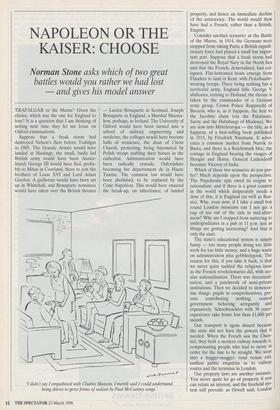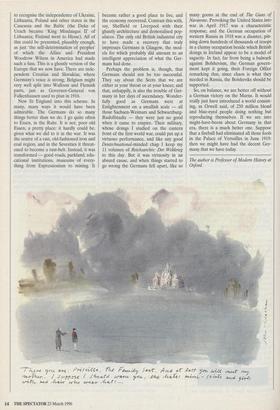NAPOLEON OR THE KAISER: CHOOSE
Norman Stone asks which of two great
battles would you rather we had lost — and gives his model answer
TRAFALGAR or the Marne? Given the choice, which was the one for England to lose? It is a question that I am thinking of setting next time they let me loose on Oxford examinations.
Suppose that a freak storm had destroyed Nelson's fleet before Trafalgar in 1805. The Grande Armee would have landed at Hastings; the small, badly led British army would have been Auster- litzed; George III would have fled, proba- bly to Mitau in Courland, there to join the brothers of Louis XVI and Lord Adam Gordon. A guillotine would have been set up in Whitehall, and Bonaparte nominees would have taken over the British thrones — Lucien Bonaparte in Scotland, Joseph Bonaparte in England, a Marshal Macma- hon, perhaps, in Ireland. The University of Oxford would have been turned into a school of military engineering and medicine; the colleges would have become halls of residence, the dean of Christ Church, protesting, being bayoneted by Polish troops stabling their horses in the cathedral. Administration would have been radically remade, Oxfordshire becoming the departement de la Haute Tamise. The common law would have been abolished, to be replaced by the Code Napoleon. This would have ensured the break-up, on inheritance, of landed I didn't say I empathised with Charles Manson. I merely said I could understand being driven to gross forms of sadism by Paul McCartney songs.' property, and hence an immediate decline of the aristocracy. The world would then have had a French, rather than a British, Empire.
Consider another scenario: at the Battle of the Marne, in 1914, the Germans were stopped from taking Paris; a British expedi- tionary force had played a small but impor- tant part. Suppose that a freak storm had destroyed the Royal Navy in the North Sea and that the French, demoralised, had col- lapsed. Flat-bottomed boats emerge from Flanders to land in Kent, with Pickelhaube- wearing troops. There being nothing but a territorial army, England falls. George V abdicates, retiring to Holland; the throne is taken by the commander of a German army group, Crown Prince Rupprecht of Bavaria, who is, as it happens, the heir to the Jacobite claim (via the Palatinate, Savoy and the Habsburgs of Modena). We are now into Mitteleuropa — the title, as it happens, of a best-selling book published in 1915, by Friedrich Naumann. It advo- cates a common market from Narvik to Basra, and there is a Reichsmark bloc, the coinage in England bearing the visages of Hengist and Horsa. General Ludendorff becomes Viceroy of India.
Which of these two scenarios do you pre- fer? Much depends upon the perspective. The Napoleonic epic owed its origins to rationalism, and if there is a great country in the world which desperately needs a dose of this, it is England (as well as Rus- sia). Why, even now, if I take a small boy round London museums can I not get a cup of tea out of the rain in mid-after- noon? Why am I stopped from nattering to undergraduates in a pub at 11 p.m. just as things are getting interesting? And that is only the start.
The state's educational system is simply funny — too many people doing too little work for too little money, and a huge waste on administration plus gobbledygook. The reason for this, if you take it back, is that we never quite tackled the religious issue as the French revolutionaries did, with sec- ular nationalisation. There was decentrali- sation, and a patchwork of semi-private institutions. Then we decided to democra- tise things: pupils in comprehensives, par- ents contributing nothing, central government behaving arrogantly and expensively. Schoolteachers with 30 years' experience take home less than £1,000 per month.
Our transport is again absurd because the state did not have the powers that it needed. When the French saw the Chun- nel, they built a modern railway towards it, compensating people who had to move in order for the line to be straight. We went into a hugger-mugger: road versus rail, endless public enquiries as to railway routes and the terminus in London.
Our property laws are another instance. You never quite let go of property if you can retain an interest, and the freehold sys- tem still prevails: as Orwell said, London needed its ground-landlords as a dog needs fleas. You might not even find out who owned the freehold of the house in which you lived, because, uniquely in the world, the land registry was secret. Bizarre notions of property meant that England did not even abolish serfdom until 1935: until then, there was an arrangement called 'copyhold'.
A Napoleonic conquest would have been quite a good thing. It would have extended the power that the Enlightened Scots had already acquired in 18th-century England. Sometimes, I think that England herself was just a sort of creaking stage set, manoeuvred by Dutch and Scots; the French would have added critical mass. Besides, the French, in victory, are human beings, and their Africa has, as things have turned out, been more of a success than our Africa.
In any case, France in 1805 was already a declining culture. The population was not growing fast, and soon it stopped growing at all. The official culture — all that ponderous classicism — was in decline. One Joey rendered Henri Qua- tre's line about putting chickens in peasant pots on Sundays as:
Je veux enfin qu'au jour marque pour le repos Chaque humble paysan des modestes hameaux Ait pour sa jouissance et par ma bienfai- sance Quelques mets a son gre reserves a l'aisance.
France herself would not, probably, have stood a Napoleonic tyranny for too long, and it is easy enough to foresee that the dynasty would have become respectable — Europe as a vast Anglo-French Jtily Monarchy, with sensible property laws and decent schools.
The German alternative? There cannot have been a more promising country than Bismarck's Germany in 1871, and her vic- tory was welcomed by any Englishman or Scotsman (I am sorry, I will not use `Briton') with any sense. There was, for a start, that hugely impressive culture. Glad- stone, when prime minister, used to review vast works of biblical scholarship in Ger- man; George Eliot knew her Hegel; Macaulay wrote learnedly about Prussia (her King, Friedrich Wilhelm II, 'a cross between Moloch and Puck'); and you can- not really understand — or perhaps just stand — Carlyle unless you can see what Germanic effects he is trying to create. Shakespeare goes into German better than into any other language, and Wagner, similarly, into English. When Bertrand Russell wondered how Whigs could come to terms with this century, he wrote a book about German Social Democracy; when Arthur Balfour was reforming education in 1902, his agents went back and forth over the North Sea; the same happened with town planning and local government. Germany was the model.
Friedrich Naumann's Mitteleuropa had much to be said in its favour: in some ways, even, it was an anticipation of the Europe that Sir James Goldsmith advocat- ed in The Trap: protectionist and ecologi- cally minded. Naumann himself was a decent enough soul, an old-fashioned liber- al with a social conscience (his name is used for the Foundation of the German Free Democrats today). His common- market notion had considerable appeal (although it broke down, at a grand confer- ence held in a hotel on the Margaret Island in Budapest in May 1918, over Hungarian agricultural exports). It had another inter- estingly topical side: a pendant in Eastern Europe. Germans of the 1914 vintage held, not wrongly, that theirs had been the pre- ponderant culture since the Middle Ages (I once saw, in Sanok in southern Poland, a 16th-century peasant daub representing German traders: large, self-important, in bulky coats: the faces were the same as now).
As the Tsarist army suffered defeats in 1915, the German Foreign Office won- dered what to do about Russia. Jagow, the senior official, said that she must be thrown back to the frontiers of 'pre-Petrine Mus- covy: a sort of greater Siberia'. One Diego von Wesendonck thought that 'even the idea of a German land-route to China can- not be ruled out'. After the Bolshevik Rev- olution, German generals dictated peace terms to the Russians. They were forced, at the Treaty of Brest-Litovsk in March 1918, to recognise the independence of Ukraine, Lithuania, Poland and other states in the Caucasus and the Baltic (the Duke of Urach became 'King Mindaugas II' of Lithuania; Finland went to Hesse). All of this could be presented, plausibly enough, as just 'the self-determination of peoples' of which the Allies and President Woodrow Wilson in America had made such a fuss. This is a ghostly version of the Europe that we now have. There are inde- pendent Croatias and Slovakias, where Germany's voice is strong; Belgium might very well split into Walloon and Flemish parts, just as Governor-General von Falkenhausen used to plan in 1916.
Now fit England into this scheme. In many, many ways it would have been admirable. The Germans do so many things better than we do. I go quite often to Essen, in the Ruhr. It is not, poor old Essen, a pretty place: it hardly could be, given what we did to it in the war. It was the centre of a vast, old-fashioned iron and coal region, and in the Seventies it threat- ened to become a rust-belt. Instead, it was transformed — good roads, parkland, edu- cational institutions, museums of every- thing from Expressionism to mining. It became rather a good place to live, and the economy recovered. Contrast this with, say, Sheffield or Liverpool with their ghastly architecture and demoralised pop- ulaces. The only old British industrial city to have made a recovery that truly impresses Germans is Glasgow, the mod- els for which probably did amount to an intelligent appreciation of what the Ger- mans had done.
Perhaps the problem is, though, that Germans should not be too successful. They say about the Scots that we are either at your throat or at your knees; and that, unhappily, is also the trouble of Ger- many in her days of ascendancy. Wonder- fully good as Germans were at Enlightenment on a smallish scale — all those Sachsen-Weimars and Schwarzburg- Rudolfstadts — they were just no good when it came to empire. Their military, whose doings I studied on the eastern front of the first world war, could put up a virtuoso performance, and like any good Deutschnational-minded chap I keep my 11 volumes of Reichsarchiv: Der Weltkrieg to this day. But it was virtuosity in an absurd cause, and when things started to go wrong the Germans fell apart, like so many goons at the end of The Guns of Navarone. Provoking the United States into war in April 1917 was a characteristic response; and the German occupation of western Russia in 1918 was a disaster, pin- ning down hundreds of thousands of troops in a clumsy occupation beside which British doings in Ireland appear to be a model of sagacity. In fact, far from being a bulwark against Bolshevism, the German govern- ment kept it going, their Foreign Office remarking that, since chaos is what they needed in Russia, the Bolsheviks should be supported.
So, on balance, we are better off without a German victory on the Marne. It would really just have introduced a world consist- ing, as Orwell said, of 250 million blond and blue-eyed people doing nothing but reproducing themselves. If we are into might-have-beens about Germany in that era, there is a much better one. Suppose that a fireball had eliminated all those fools in the Palace of Versailles in June 1919: then we might have had the decent Ger- many that we have today.
The author is Professor of Modern History at Oxford.




































































 Previous page
Previous page